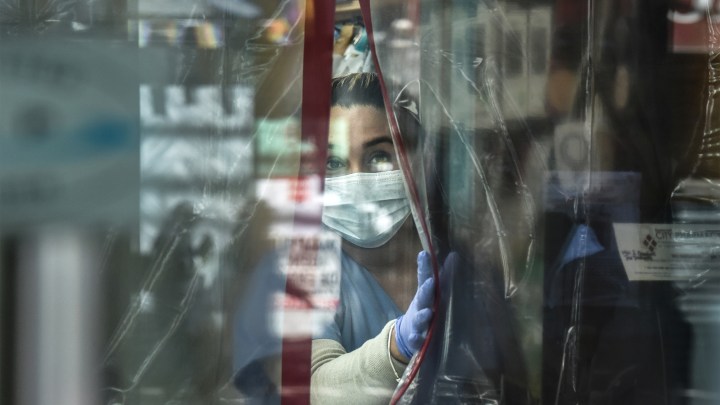
Essential workers pressured by mental health issues
Essential workers pressured by mental health issues

The pandemic is a crisis in this country on so many fronts: unprecedented health risks, economic collapse and — now it’s clear — mental health challenges. A new report from the CDC shows Americans are increasingly suffering symptoms of anxiety and depression, turning to substance use and even contemplating suicide at higher rates.
One group that has been particularly hard hit is essential workers.
Ashli Hinds works not one, but two essential jobs in Fort Worth, Texas. She’s a package handler for a shipping company and does on-site tech support for an aerospace firm. But last Monday, she just needed a break.
“It was just one of those days,” she said. “I was able to tell my boss, you know, ‘Hey, I want to take a mental health day.’ “
She worries about her own health — as a Black woman with diabetes, she’s particularly at risk. And because she works outside the home, she doesn’t want to endanger her friends or family, so she’s usually alone.
“It is depression. It’s like a monkey on my back,” Hinds said. “Like I have nowhere to go, nobody to go see — and that’s the hard part.”
According to the report from the Centers for Disease Control and Prevention, more than half of essential workers have experienced mental health issues in recent months. That’s 25% more than the general population. More than a fifth have contemplated suicide.
Many low-wage service jobs have become less secure. Kiara Iverson has seen her hours cut at a big-box store outside Milwaukee.
“It is a bit scary because, you know, my relatives are older. We don’t have enough money in our pockets to deal with all of that,” she said.
Jobs in health care, while always stressful, have become even more traumatic during the pandemic, according to Dr. James Rachal, a psychiatrist with Atrium Health in Charlotte, North Carolina.
“Especially early on in the disease process, there was very little we could do. So it was very disempowering for a lot of health care workers that typically have some solution or some cure at their fingertips,” he said. “Sometimes it was colleagues they were seeing that were getting sick.”
Ironically, Rachal said getting help for mental health issues often hasn’t been accepted or prioritized in the field.
Many essential service workers have limited resources for help. Sarah Norton heads a Twin Cities nonprofit that offers counseling services to restaurant workers.
“I mean, the industry itself was lacking a safety net prior to this,” she said.
Norton said she’s seen a 75% increase in calls to their crisis hotline since the pandemic began.
If you or someone you know is struggling with suicidal thoughts, anxiety or depression, call the National Suicide Prevention Lifeline at 1-800-273-8255 or text the Crisis Text Line at 741741. Here’s how to find help outside the U.S.
There’s a lot happening in the world. Through it all, Marketplace is here for you.
You rely on Marketplace to break down the world’s events and tell you how it affects you in a fact-based, approachable way. We rely on your financial support to keep making that possible.
Your donation today powers the independent journalism that you rely on. For just $5/month, you can help sustain Marketplace so we can keep reporting on the things that matter to you.


















